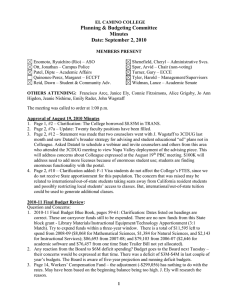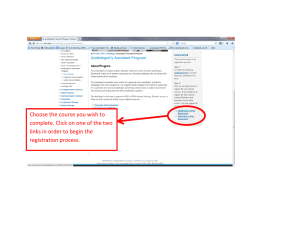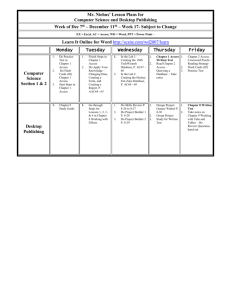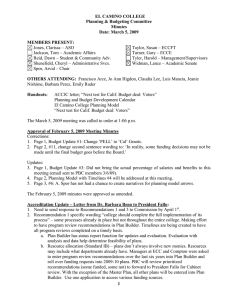January 21, 2010
advertisement
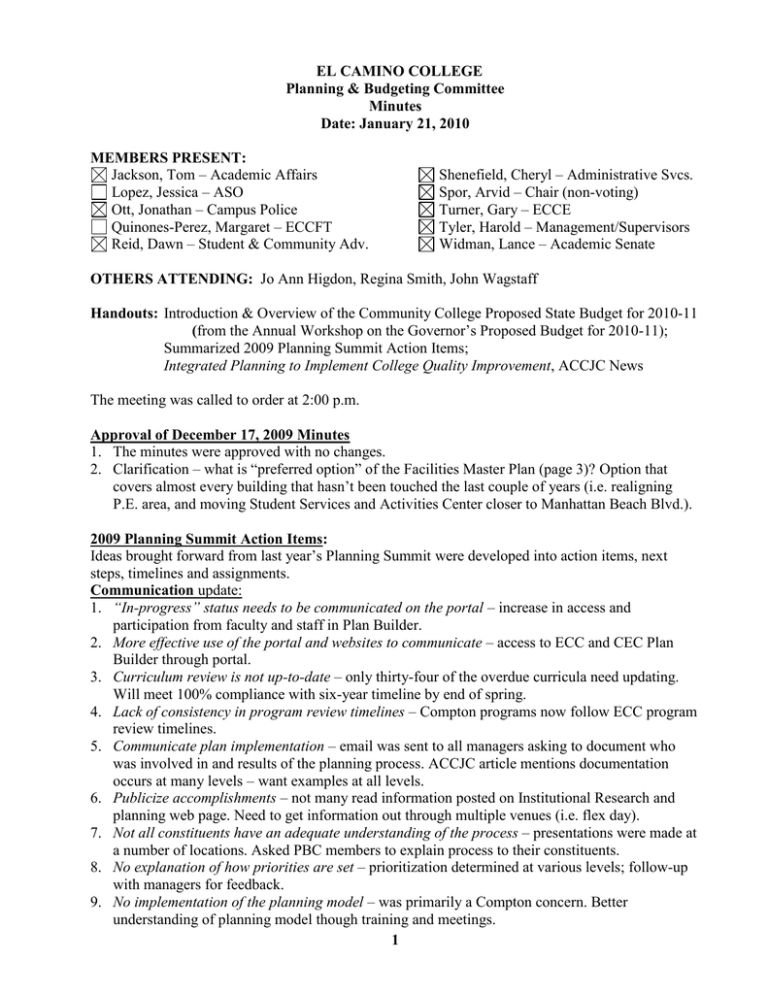
EL CAMINO COLLEGE Planning & Budgeting Committee Minutes Date: January 21, 2010 MEMBERS PRESENT: Jackson, Tom – Academic Affairs Lopez, Jessica – ASO Ott, Jonathan – Campus Police Quinones-Perez, Margaret – ECCFT Reid, Dawn – Student & Community Adv. Shenefield, Cheryl – Administrative Svcs. Spor, Arvid – Chair (non-voting) Turner, Gary – ECCE Tyler, Harold – Management/Supervisors Widman, Lance – Academic Senate OTHERS ATTENDING: Jo Ann Higdon, Regina Smith, John Wagstaff Handouts: Introduction & Overview of the Community College Proposed State Budget for 2010-11 (from the Annual Workshop on the Governor’s Proposed Budget for 2010-11); Summarized 2009 Planning Summit Action Items; Integrated Planning to Implement College Quality Improvement, ACCJC News The meeting was called to order at 2:00 p.m. Approval of December 17, 2009 Minutes 1. The minutes were approved with no changes. 2. Clarification – what is “preferred option” of the Facilities Master Plan (page 3)? Option that covers almost every building that hasn’t been touched the last couple of years (i.e. realigning P.E. area, and moving Student Services and Activities Center closer to Manhattan Beach Blvd.). 2009 Planning Summit Action Items: Ideas brought forward from last year’s Planning Summit were developed into action items, next steps, timelines and assignments. Communication update: 1. “In-progress” status needs to be communicated on the portal – increase in access and participation from faculty and staff in Plan Builder. 2. More effective use of the portal and websites to communicate – access to ECC and CEC Plan Builder through portal. 3. Curriculum review is not up-to-date – only thirty-four of the overdue curricula need updating. Will meet 100% compliance with six-year timeline by end of spring. 4. Lack of consistency in program review timelines – Compton programs now follow ECC program review timelines. 5. Communicate plan implementation – email was sent to all managers asking to document who was involved in and results of the planning process. ACCJC article mentions documentation occurs at many levels – want examples at all levels. 6. Publicize accomplishments – not many read information posted on Institutional Research and planning web page. Need to get information out through multiple venues (i.e. flex day). 7. Not all constituents have an adequate understanding of the process – presentations were made at a number of locations. Asked PBC members to explain process to their constituents. 8. No explanation of how priorities are set – prioritization determined at various levels; follow-up with managers for feedback. 9. No implementation of the planning model – was primarily a Compton concern. Better understanding of planning model though training and meetings. 1 10. Consideration for how plans affect/impact other areas on campus – needs more work. Concern that people who create plans may not be talking to other groups involved. 11. Find a way to connect ECC and CEC Plan Builder – Plan Builders are on two separate servers. Compton employees now have access to view ECC plans for better understanding and insight. Processes update: 1. Need a better process for enhancing existing budgets to meet new demands – plans must be in Plan Builder to be considered for multiple funding sources (Funds 11, 14, and 15, instructional block grants and CTEA). 2. No understanding of how plans are adjusted when budgets are tight – plans need to be adjustable. Managers were asked to adjust their budgets for 3% reduction in fund 11. 3. Lack of planning linkage and its outcomes to how it improves student learning – entire college needs to think how their plans affect student learning. 4. Need to further refine our process of developing planning from program review – prioritize recommendations at program level plans. 5. Need to base program review recommendations on tangible criteria that incorporate the needs of students, the campus, and the community – need to expand needs throughout the campus community. 6. Allocation of (budget) resources not visible in planning process – can do a better job of making people understand what is funded through various sources. Inform college community how budget impacts plans. 7. SLOs not visible on Planning Model – added with core competencies. 8. Evaluation process is more ad-hoc rather than systematic – was true about a year ago. Reminders sent to managers to complete evaluations (qualitative or quantitative updates) every six months, in January and July. 9. Planning process needs to include institutionalization of successful programs – may occur, but if one program is institutionalized, another may need to be down-sized or eliminated to balance the budget. 10. Streamline process for filling vacant, funded positions – not on new staffing plan – requires more work. Involvement update: 1. Lack of access to or broad participation in Plan Builder – increased active participants and fulltime staff and faculty access to Plan Builder. 2. Assign responsibility for each goal and objective – program leaders are responsible for goals and objectives for each program plan. Implementation update: 1. Plans lack supporting documentation for requests – still somewhat true today. Emailed managers today asking for data to get better understanding of what is being used. Will still need to increase amount and type of data when creating and evaluating plans. 2. Availability of raw data for decision-making – more information is available on the Institutional Research and Planning web page. 3. Plans should include non-budgetary items – already occurring (i.e. SLOs). 4. Need for a program reduction or termination assessment and process – Academic Senate has volunteered to take the lead on this topic. 5. Bond implementation needs to be improved at CEC – new CEC Master Plan would help guide process. 6. Comprehensive Master Plan has components not being evaluated, communicated, or implemented – working on Master Plan updates which will be ready by Planning Summit. Discussion: 1. Was the process for special contract funds suspended in lieu of using fund 15 to backfill categoricals? Some fund 15 monies were used for categoricals and some are in contingency. 2 Special contract funds process was too labor intensive, but opinion expressed that PBC engaged in constructive dialog when VPs presented their lists of plans that were approved or not approved. Plan Builder is easier to use. Other than using the budget book, how can fund 15 monies be tracked? Fund sources can be identified in Plan Builder if written into the narrative. PBC members have the ability to view plans in Plan Builder. 2. Planning discussions are involving greater numbers of faculty and staff this year. Counseling has a multi-tiered planning process involving meetings with their faculty, classified staff and division council to discuss, vote and rank priorities, in line with the division’s program review. In other areas, faculty are key drivers of their program plans. Governor’s 2010-11 Budget Proposal: 1. Projected $20B state budget shortfall, $6.6B from 2009-10 and $13.3B for 2010-11. Proposals to close gap with cuts to health and welfare programs, assumption of receiving $7B in federal aid, extension of temporary tax increases, and delay in tax breaks. 2. This is the start of a ‘long and fierce budget process.’ This is the best scenario for community colleges at this point. 3. Major components include: a. Proposal of 2.2% enrollment growth b. Negative COLA (-0.38%). c. Property tax adjustment - estimate shortfalls in 2010-11, not in current year. d. $20M Categorical Funding reduction – $10M each for EOPS and part-time faculty compensation with the funding redirected to Career and Technical Education. e. Suspension of state mandates – the Legislative Analyst Office recommends review on a program-by-program basis. f. Increased categorical flexibility – Basic Skills will be added to list of programs subject to flexibility. Advised by Chancellor’s office to transfer nominal amounts among flexible programs to remove mandates; will be submitted as a board agenda item in February. g. Suspension of new Competitive Cal-Grant Awards – huge issue in student services area. h. Student Enrollment Fees – no proposed increases in the Governor’s budget. i. STRS Cost Adjustment – waiting for more definitive information from STRS. j. Advanced Transportation Technologies and Energy Program – some funding will be available from the California Energy Commission to expand college instructional programs in transportation and alternative fuels. k. Lease Purchase Agreements may refer to LACCD. l. Adjustment for the 2019-10 Deferral – expect to get continuously worse and add to cash flow issues. m. Proposition 98 – Governor will continue to fund in total, but keep pulling revenues out of Proposition 98 and putting them in special funds. 2010 Planning Summit is scheduled on Friday, March 19, 2010. Possible future agenda item: how the Federal Health Care Bill will affect ECC budget if it passes. The next meeting is scheduled on February 4, 2010. The meeting ended at 3:00 p.m. 3
